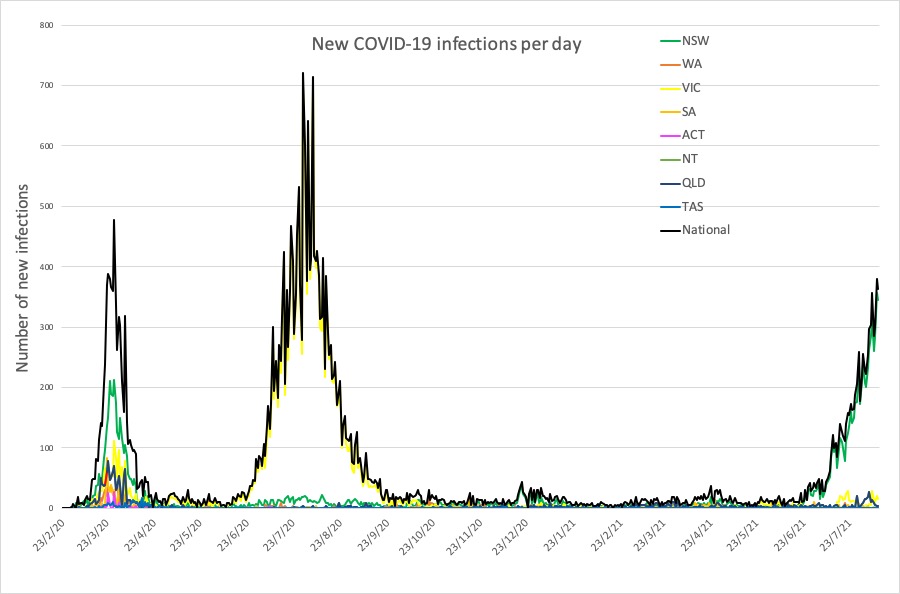And around one in five cases of vaccine-linked thrombosis are fatal, but no risk factors have been identified.
Welcome to The Medical Republic’s COVID Catch-Up.
It’s the day’s covid-19 news in one convenient post. Email bianca@biancanogrady.com with any tips, comments or feedback.
12 August
- Prevalence of anxiety and depressive symptoms in adolescents has doubled during the pandemic.
- Just over one in five vaccine-linked thrombosis cases are fatal, but no evidence of risk factors.
- Moderna vaccine found safe for adolescents, as TGA issues provisional authorisation for 18 years and older.
- mRNA vaccines before or during first trimester not associated with increased rate of spontaneous abortion.
- How’s Australia’s vaccine rollout progressing?
- Q&A: when can previously infected people get vaccinated?
- ACT residents under stay-at-home orders from 5pm today after one case reported.
- Global infections top 200 million.
- Australia records first covid death in fully-vaccinated individual.
- Latest covid-19 infection numbers from around Australia.
Rates of depression and anxiety in children and adolescents have doubled during the pandemic, according to a meta-analysis published in JAMA Pediatrics.
Researchers analysed 29 studies of the population-based prevalence of depression and anxiety – involving more than 80,000 youth around the world – and found the overall prevalence of clinically elevated depressive symptoms was around 25% and clinically elevated anxiety symptoms was 21%.
The authors noted that these figures are around double those seen before the pandemic: around 13% for depression and just over 11% for anxiety.
“The COVID-19 pandemic, and its associated restrictions and consequences, appear to have taken a considerable toll on youth and their psychological well-being,” they wrote.
The mortality rate from vaccine-induced immune thrombocytopenia and thrombosis in the United Kingdom is around 22% but there do not appear to be any clear medical risk factors, according to a study of 237 cases linked to the AstraZeneca vaccine.
Writing in the New England Journal of Medicine, researchers reported that the age of presentation ranged from 18-79 years, with a median of 48, and 85% of those affected were under 60 years. There were slightly more women than men.
Twenty-two percent of the patients died. The odds of death were 2.7-fold higher in those with cerebral venous sinus thrombosis – which affected around half the group. Each 50% decrease in baseline platelet count was associated with a 70% increase in risk of death.
Around 40% of those affected had no previous medical conditions, but even among those with a medical history, there were no diagnoses or medications that appeared at a greater frequency than in the general population.
The Moderna vaccine appears to be safe in adolescents, with no serious adverse events seen in a phase 2/3 placebo-controlled trial in 3723 children aged 12-17.
The study, published in the New England Journal of Medicine, also looked at efficacy but the small number of infections – none in the vaccine group and four in the placebo group – meant it was “difficult to assess precisely”, the authors wrote.
More than 90% of those given the two-dose vaccine experienced injection site pain after the first or second dose. Just over two-thirds experienced systemic reactions – most commonly fatigue, headache, muscle aches and chills – after the first dose, and 86% experienced systemic reactions after the second dose.
The study reported no cases of multisystem inflammatory syndrome, myocarditis or pericarditis.
The vaccine achieved similar rates of neutralising antibodies in the adolescents as have previously been documented in adults.
The Therapeutic Goods Administration recently granted provisional approval to the Moderna vaccine for use in Australia in individuals aged 18 years and older, with the two doses to be given 28 days apart. The TGA says a decision about whether to approve it for those aged over 12 years will be made in the next few weeks.
Head of the National COVID Vaccine Taskforce Lieutenant General John Frewen told 3AW radio recently that the government had a contract in place for 10 million doses of Moderna, but had not yet received information about when those doses would be delivered.
MRNA covid vaccines are not associated with an increased risk of spontaneous abortion in pregnant women, research suggests.
A non-peer-reviewed preprint paper analysed data from 2456 pregnancies in the US Centers for Disease Control’s vaccine pregnancy registry, and found the rate of spontaneous abortion among women given an mRNA covid vaccine was the same as the expected range for recognised pregnancies. The vaccines were given either preconception or before 20 weeks’ gestation.
“While there is no compelling biological mechanism to expect that mRNA COVID-19 vaccines present a risk to pregnancy, data have been limited to guide pregnant people and healthcare professionals about vaccination in the preconception period and during pregnancy,” the authors wrote.
What’s the latest on Australia’s vaccine rollout? Here’s how it’s looking so far:
Overall, 23.73% of Australians aged over 16 years are fully vaccinated, and 45.36% have had at least one dose of a covid vaccine. Those percentages are, of course, higher in older age groups:
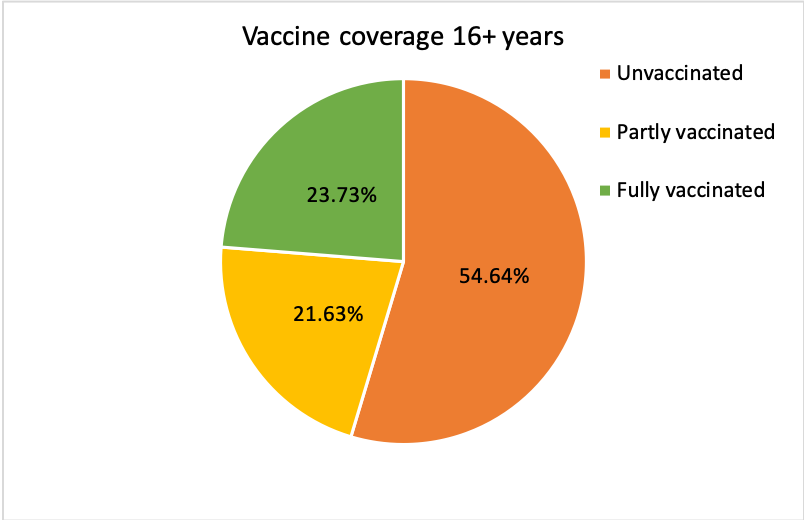
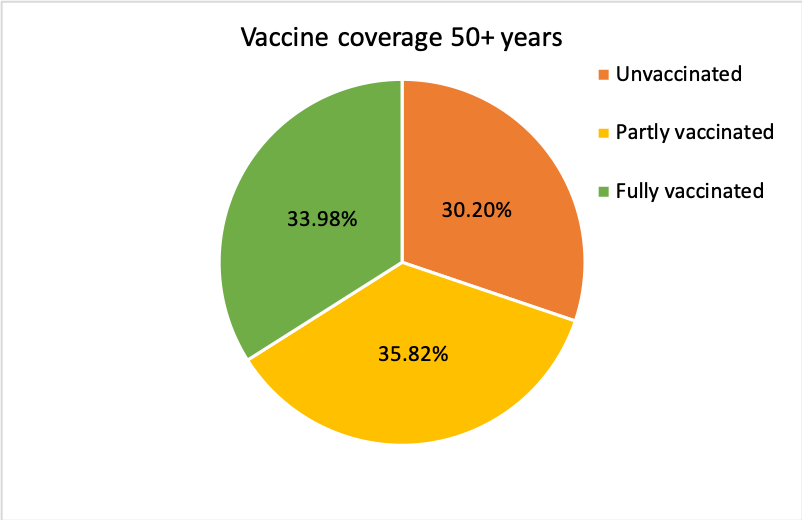
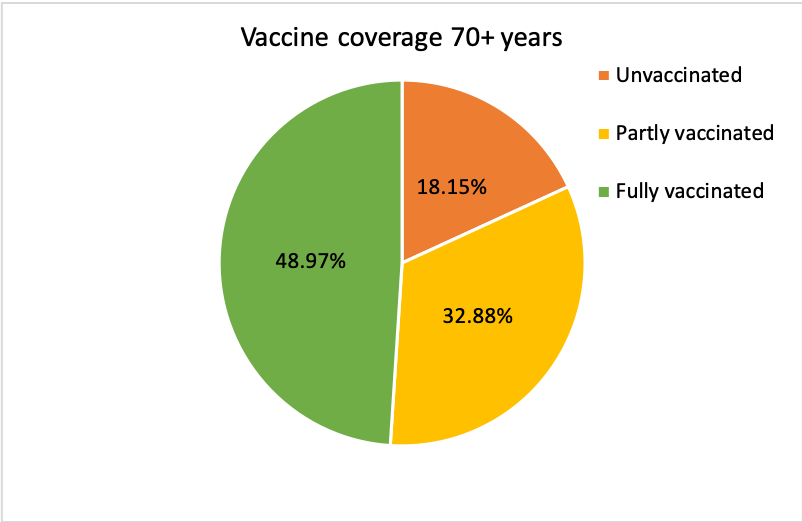
We can see this broken down by five-year age groups, which shows the much higher two-dose coverage in the older age groups, but the high level of one-dose coverage in the 50-70-year-olds:
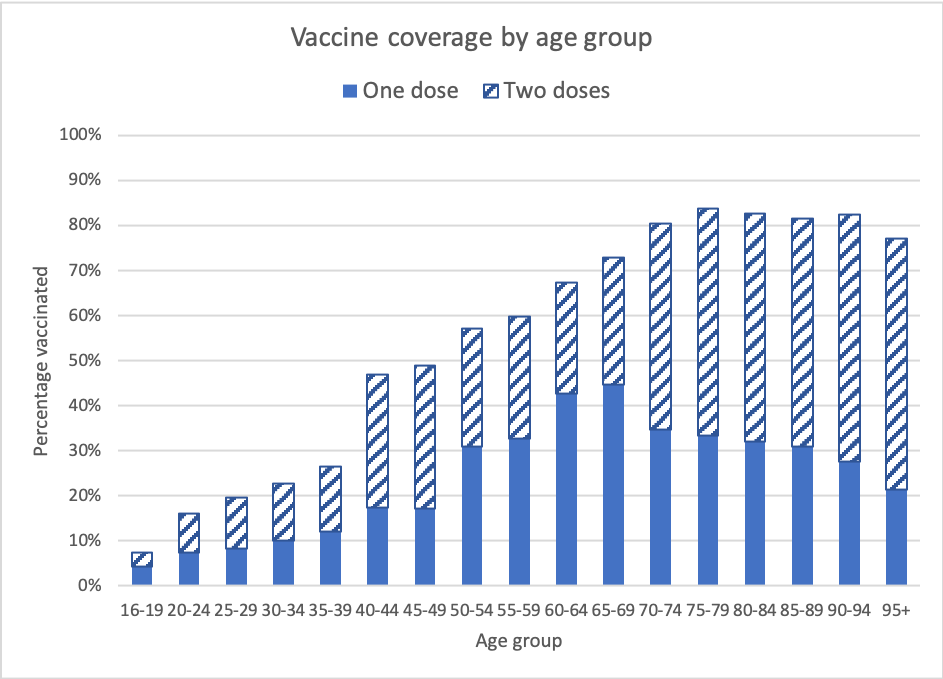
But things are getting very interesting in younger age groups, as the AstraZeneca vaccine has been opened up to under 40s and as more Pfizer dribbles its way into vaccination clinics. This shows the rapid increase in uptake of first dose in those aged 16-19 years, while the 70-74-year-olds are now lining up in force for their second dose of AstraZeneca:
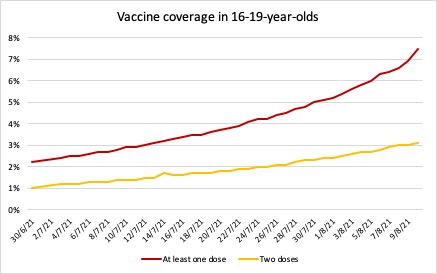
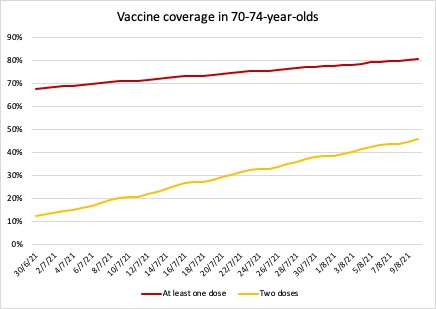
Women in their 20s are turning out in much greater numbers than young men to get vaccinated, and generally show greater vaccine coverage across the board in those aged under 60. But in those aged 75-94-years, there’s slightly higher vaccine coverage in men than women.
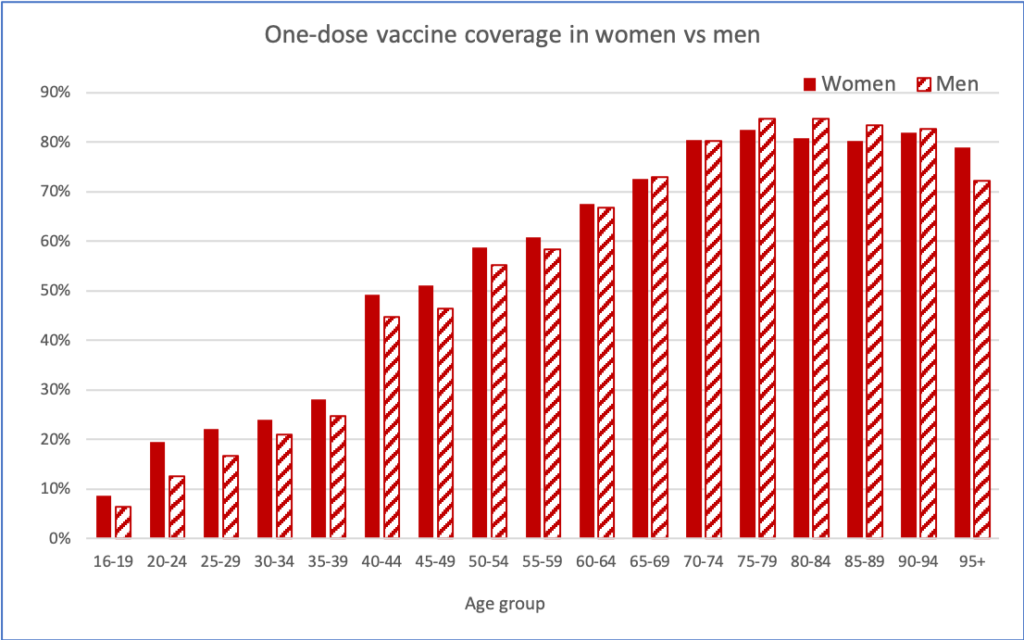
(Data source: https://www.health.gov.au/resources/publications/covid-19-vaccination-doses-by-age-and-sex
Q: When can covid infected patients get their vaccinations?
A: Firstly, the unequivocal advice from numerous health authorities – backed by evidence such as this study showing vaccination does reduce the risk of reinfection – is that people who have had covid should still get vaccinated.
There are no guidelines about the best time to get vaccinated after you’ve had covid, but the Cleveland Health Clinic in the US suggests getting vaccinated as soon as you’re out of quarantine. The one caveat is in patients who have been treated with monoclonal antibodies or convalescent plasma; the US Centers for Disease Control recommends waiting 90 days after these treatments before getting the vaccine.
There’s also some evidence that a single dose of vaccine in a previously infected person could be enough to generate the same levels of neutralising antibodies as two-dose in an infection-naïve individual. But for the time being, previously infected individuals are advised to get both doses of vaccine.
(Thanks for the question, and keep them coming! The form for submitting questions is at the bottom of this post).
The ACT has joined the growing list of states and areas implementing stay-at-home orders to combat the spread of the Delta variant, after a man in his twenties tested positive and he had been infectious in the community since Sunday morning.
The seven-day stay-at-home orders mean Canberrans should only leave home for essential work, medical care – including vaccination – groceries or one hour of exercise per day, and within their local area. Masks are mandatory outside the home.
Schools will be closed but remote learning is not yet activated for the short lockdown.
Global covid infections have now topped 200 million, just six months after reaching 100 million cases, according to the latest WHO update.
New cases and deaths have increased slightly in the last week compared to the previous week – 4.2 million new infections and more than 65,000 deaths were reported.
The United States has experienced a 35% increase in new cases in the last week compared to the week before, but a positive sign is that new infections have decreased in India , Brazil and Indonesia.
In the United Kingdom, infections have decreased from the peak that occurred around the time England launched into ‘Freedom Day’, when all public health restrictions were lifted. That peak saw just over 60,000 cases reported in a single day, but daily infections have since dropped to around half that. Daily hospitalisations are now around 700-800 a day, and deaths average around 82 per day over the past week.
Australia has recorded its first death in a fully-vaccinated individual: a man in his 90s who died in Sydney yesterday.
Here are the latest covid-19 infection numbers from around Australia to 9pm Wednesday:
National – 37,372 with 944 deaths
ACT – 124 (0)
NSW – 11,902 (345)
NT – 199 (0)
QLD – 1929 (3)
SA – 868 (0)
TAS – 235 (0)
VIC – 21,056 (15)
WA – 1059 (0)
